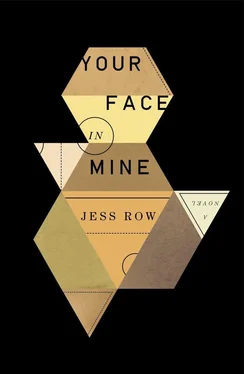He stops and stares at me.
I don’t care what Julie-nah told you, he says. It wasn’t about recruitment. Yeah, maybe once upon a time I thought that was a bright idea. A little synergy. But it isn’t for you. You still want my opinion? Leave. Take the money and go. What did I want out of you? Honestly, I don’t even know anymore. I’m sorry. I saw you that day and I thought—
— as a tribute—
— as a debt to be repaid—
— our lives were so bound up together, once. Doesn’t that mean anything? There has to be a way of distinguishing that from the profit motive.
No, no. No. Don’t separate money and happiness. That’s the guilty liberal in you speaking. Don’t act as if it has to be a tradeoff. You can have everything. Haven’t you heard anything I’ve been trying to tell you? Everywhere you look in life there might be an open door in your peripheral vision. That’s what you should take from this. Want to get the surgery? Fine. Want to go back to Baltimore? Fine. Whatever it is, be your own boss. Make your own life. Pay your own way.
I’m beginning to feel something. What is it? Was there something in the tea this morning, the tea Julie-nah brought up from downstairs? An enormous hot ball of honeyed light pushing its way up and through my rib cage. Could it be that this is what feeling feels like? It tastes like anger, but it’s not anger. A spasm of horror over all that wasted time. He planned it all, of course; he choreographed it like Diaghilev. Someday I’ll do the same. Maybe even to him.
This, I think, is what they call a win-win.
I’m doing it, I say. Look out, Martin. I’m going to surprise you.
You ready to be a self-made man?
I’m all in, I say. The cliché doesn’t stumble across my teeth the way I thought it would. I have to get used to clichés now, I’m thinking. Trafficking in them. Fortunes rise and fall that way.
Well, then — he looks at me with a rueful smile. What can I say? He holds out his hand, and when I take it, I feel something hard in the palm: a little rectangle, a hard stub, the thickness of two sticks of gum. I move it to my pocket: a flash drive. Welcome aboard, man, he says. Welcome aboard.
HUE, INC.
(Formerly Orchid Group, Ltd)
5-YEAR STRATEGIC PLAN AND MARKET ASSESSMENT
HUE is on the leading edge of the most exciting health and lifestyle technology of the twenty-first century: high-impact, permanent physical redesign of the body based on desirable ethnic characteristics. Using a combination of existing procedures and new patented and patent-pending technologies, HUE is positioned to be the first company in the field to offer a streamlined, comprehensive, globally marketed treatment for clients seeking a markedly different physical appearance. Based in Bangkok, Thailand, already a highly desirable destination for aesthetic surgery, we offer a complete personal-transformation experience, including five-star-level housing at a private villa, private consultations with the surgeon (a leading researcher in the field) and support staff from around the world, and assistance with the legal, financial, and psychological aspects of VIT (visual identity transition).
Why is HUE a wise investment for brokers and individuals seeking to diversify a global technology/emerging technology portfolio? According to an article in Bloomberg News , July 3, 2011, “cosmetic surgery is poised to reach parity with cosmetics in overall consumer spending by 2020.” However, because of traditional restrictions on physicians and health corporations operating internationally, no large market player has emerged to represent this industry in the global economy. Indeed, most cosmetic surgeons still operate in individual practices in most major markets, including the United States, the UK, Brazil, Argentina, Japan, Thailand, Korea, and South Africa.
Thanks to the foresight of our founder, Binpheloung Silpasuvan, HUE has the intellectual property protection to consolidate development of these new technologies under one corporate entity. Simply put, HUE owns the rights to a variety of treatments and pharmaceutical compounds essential to our key procedures, such as permanent skin alteration (PSA) and augmented rhinoplasty (AR). These processes can obtain breathtaking results — just look at the enclosed photos. In Dr. Silpasuvan’s own words, “We are witnessing a major shift in the potential for altering our individual self-image. No longer are we restricted to the ethnic identity or physiognomy we were born with. For a variety of reasons, under a variety of conditions, a person may choose the visual appearance that answers their deepest psychic needs or the circumstances of their present life. Virtually any transformation is possible. [HUE] is poised to become an international brand synonymous with these permanent and life-changing acts.”
How large a market are we talking about? Consider these statistics: in a survey conducted in 2011, 21 % of adults 18–30 in South Korea said they had had cosmetic surgery and 83 % said they had considered or planned cosmetic surgery in the next five years. Virtually all of these surgeries involve alterations to the epicanthal fold of the upper eye, a procedure that, according to sociologist Ju-nah Park, “is strongly associated, in visual-association tests, with European beauty standards.” In South and East Asia, according to a 2006 study by the Economist Intelligence Unit, nearly $3 billion USD is spent annually on products and procedures designed to lighten the skin — despite the fact that virtually all of these products have limited efficacy and some carry well-known health risks. According to HUE’s own analysis (Appendix A) the potential global market for VIT might eventually reach as high as $10–15 billion.
What are the ethical and legal issues involved? As with any emerging health technology, VIT poses a number of concerns that will inevitably arise once HUE makes its debut as a public entity. At the same time, we must be aware that, just as norms of beauty can vary widely among cultures, each culture holds distinct views about the limits of permissible body modification. These views and norms are also subject to increasingly rapid shifts and developments, due to the globalization of visual culture. HUE is invested in strategic development for cultural scalability. Drawing on the latest market research and sociological surveys, our sales force will be able to target products at an emerging consensus model of beauty in a highly homogeneous marketplace (Italy or South Korea) or offer a more customizable, customer-centered experience for customers in a more diverse, trend-driven market or submarket (Tokyo or Los Angeles).
At the same time, we intend to use partnerships in the medical and bioethical community to develop a rationale for Racial Dysphoria as a psychiatric diagnosis. Over time (particularly with inclusion in the DSM and other diagnostic authorities) this opens the possibility for VIT as a covered, insured condition, removing barriers to affordability throughout the industrialized world. This two-pronged approach will allow HUE to drive the market from both ends, as a provider of both residential complete identity transition (a process which takes at least a year) and discrete, targeted outpatient treatments where smaller modifications may produce the desired result.
Our corporate mission is to create value for our shareholders by offering consistent, high-quality results while aggressively expanding our customer base. We have been highly successful at attracting the seed capital that has brought us to this level. At this point we are looking for large-stake investors to help us expand our operations in Thailand and develop PR and customer service operations for the North American, European, Middle Eastern and East Asian markets. Interested investors should contact Martin Wilkinson at wilkinson@orchidgroup.com or 011-410-435-4567.
Читать дальше












